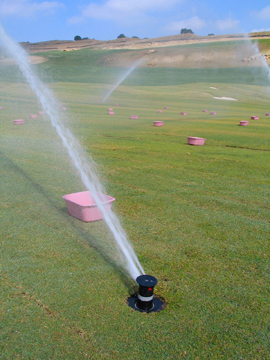Irrigation Audits

The Riverside-Corona Resource Conservation District (RCRCD) provides free technical assistance to "cooperators", and property owners who are interested in conserving their natural resources, per Divison 9 of the California Public Resources Code Article 1 Policy 9001 Section B Article 4. Farmers, homeowners, and businesses of the greater Riverside area may be eligible to receive free irrigation evaluations or other resource assistance. The Conservation District has conducted over 1,000 evaluations on more than 10,000 acres since 1987.
The RCRCD's Irrigation Water Management (IWM) Mobile Lab auditor evaluates irrigated sites with operational systems. Irrigation systems are tested for uniformity and efficiency of water delivery.
Is water reaching the intended plants?
If applied too broadly, water is wasted on adjacent surfaces, such as sidewalks, streets, or parking lots. Over spray may be the result of incorrect spray adjustment or arc selection.
If applied too deeply, water moves below the root zone and is lost from plants.
If applied too quickly, water may runoff the surface before it can infiltrate into the soil. Runoff often causes erosion, which creates sediment, a pollutant to local waterways. Most runoff is not from the soil surface but from water being applied to hardscapes.
Is water applied evenly and uniformly?

Inefficient water use is often the result of leaky, clogged, or worn components or incorrectly installed pipes and sprinklers. Well-designed systems become less effective when mismatched replacement parts are used and when systems are not maintained.
Water pressure is measured to determine its effect on sprinkler and emitter output. Misting may indicate that pressure is too high, while a doughnut shaped water pattern may mean that pressure is too low.
An auditor analyzes system effectiveness, looking for problems such as uneven water distribution. The auditor considers site conditions including system output, plant water-requirements, timing of irrigation, and weather data.
The onsite evaluation determines soil conditions and cultural practices that affect irrigation. A report is developed based on field test data, soils, and weather data. The report indicates potential water savings, deep percolation losses, and maintenance needs.
Scheduling an Audit:

For questions or to schedule an audit, please contact Jose Iniguez at iniguez@rcrcd.org. Audtis are conducted on properties with an irrigation system that waters a half acre or more . Evaluations will be provided free of charge if your property lies within the RCRCD boundaries or within the service area of Riverside Public Utilities (RPU) and meets the water audit criteria. Evaluations include a system uniformity test, soil test and results report. Evaluations are provided on a first-come, first-served basis
Kerwin's Korner:
Enjoy some tips and knowledge from our District Manager, Kerwin Russell
Determining Soil Type and Proper IrrigationConverting Standard Irrigation to DripProper Irrigation of Oaks
